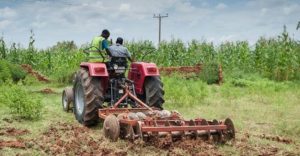Sasakawa Africa Association (SAA), an international non-profit organsation, has trained no fewer than 5,000 smallholder farmers in Nasarawa State on regenerative agriculture to boost crop production and reduce effects of climate change.

Mr Ibrahim Fagge, SAA’s Technical Coordinator, Regenerative Agriculture, stated this during a media field trip to some farm locations on Thursday, October 26, 2023, in Lafia and Akwanga Local Government Areas of the state.
Fagge said that the training was part of the organisation’s Japan-funded interventions in the state aimed at making farmlands more productive and resilient by increasing soil fertility, biodiversity and agricultural ecosystems for sustained crop production.
He said that the organisation promotes innovative technologies that restore degraded soil health and biodiversity and reduce greenhouse gas emissions in farms.
According to him, SAA also promotes and create awareness on adoption of biofortified and nutrient-dense crops that will improve the health and livelihood of rural communities.
Some of the beneficiaries who spoke to newsmen during the field trip commended the organisation for the intervention and testified of its impact on their lives.
Mr Ngaji Ali, Secretary of Dacewa Multi-purpose Cooperative, Shabu in Lafia, said that the group introduced new rice production technologies called “Bokashi and Biochar” to them, which help in the maintenance of soil health.
“The materials used for the production of ‘Bokashi and Biochar’ are affordable and accessible – majorly rice husks and other decomposing items and we also learnt how to incorporate them in our farms during land preparation.
“They say it help to improve the physical, chemical and biological property of the soil and repair its structure and texture for a very long time,” he said.
Ali said they were also taught how to apply fertilisers to their farms; by burying in the soil as against their usual practice of broadcasting that results in the emission of greenhouse gas from the fertiliser.
He pointed out that the farmers were also exposed to other agronomic practises in rice production from land preparation to seed nursery and transplanting.
“Before, in planting rice, we broadcast and you can hardly harvest 10 bags from a hectare of land, but now the story is different.
“You can imagine, we have harvested four 135 kilogramme bags of rice from this pilot plot of 20/50 metres by putting into practice all that we were taught,” he said.
Ali said the output from their farms became a reference point for other farmers in the community, who come to learn to apply same.
In Akwanga, Mr Ibrahim Hassan, Chairman of Nunku Farmers’ Cooperative Society, said SAA provided them with improved biofortified improved maize seeds that had impacted greatly on their production.
He said the yield of the pro-vitamin ‘A’ maize seed given to them was phenomenal.
Hassan explained that he usually harvests less than four bags of maize from his one hectre farm. However, with the improved seed and new farming method learnt from SAA, he was able to harvest almost 10 bags of maize from same field.
He further said that the organisation taught them how to inter-crop cereals and legumes such as maize and soyabeans on same plot of farmland as part ways to regenerate the soil for increased productivity.
Mrs Salome Sabo, SAA Coordinator in Nasarawa State, said the farmers were trained in 38 communities across six local government areas in the state.
By Oboh Linus
